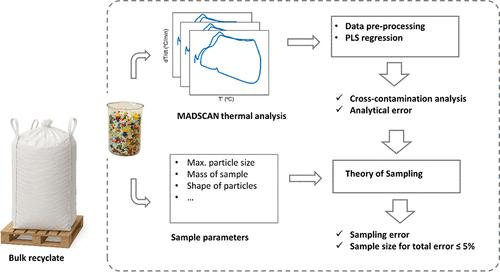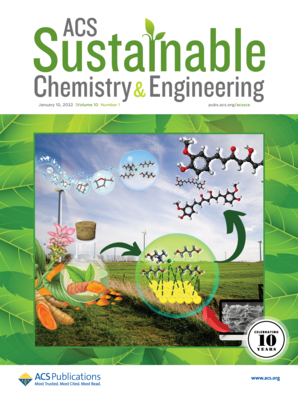分析塑料回收中的样本大小和交叉污染:一种结合抽样理论的新型热分析方法
IF 7.3
1区 化学
Q1 CHEMISTRY, MULTIDISCIPLINARY
引用次数: 0
摘要
塑料回收行业的一个关键问题是由于交叉污染导致回收材料质量下降,导致材料损失过大。确定回收批次中的交叉污染水平填补了质量控制中的关键空白,有助于确定合适的应用并提高物料流的价值。一个关键的挑战在于选择一个样本的大小,以准确地代表在吨批次每天处理的巨大变化。这项工作提出了一个数据分析框架,以准确估计塑料回收批次中的交叉污染水平,并确定满足行业需求所需的样本量,同时考虑分析和抽样误差。此外,这项工作介绍了MADSCAN,一种新颖的,无标度的热分析技术,允许分析由框架确定的样本大小。目标包括为行业利益相关者提供关键信息,协助监管机构建立质量控制流程,并指导技术提供商推进循环经济的测量技术,重点是满足样本量和准确性要求。本文章由计算机程序翻译,如有差异,请以英文原文为准。

Analyzing Sample Size and Cross-Contamination in Plastic Recycling: A Novel Thermal Analysis Method Coupled with Sampling Theory
A crucial issue in the plastic recycling industry is the loss of quality in recycled materials due to cross-contamination, which leads to excessive material losses. Determining cross-contamination levels in recyclate batches fills a crucial gap in quality control, helping to identify suitable applications and enhance the value of the material stream. A key challenge lies in selecting a sample size that accurately represents the large variability within the tons of batches processed daily. This work presents a data analysis framework to accurately estimate cross-contamination levels in plastic recyclate batches and determine the sample size required to meet industry demands while accounting for both analytical and sampling errors. Additionally, this work introduces MADSCAN, a novel, scale-free thermal analysis technique that allows for the analysis of the sample sizes identified by the framework. Objectives include providing crucial information to industry stakeholders, assisting regulators in establishing quality control processes, and guiding technology providers in advancing measurement techniques for the circular economy, with a focus on meeting sample size and accuracy requirements.
求助全文
通过发布文献求助,成功后即可免费获取论文全文。
去求助
来源期刊

ACS Sustainable Chemistry & Engineering
CHEMISTRY, MULTIDISCIPLINARY-ENGINEERING, CHEMICAL
CiteScore
13.80
自引率
4.80%
发文量
1470
审稿时长
1.7 months
期刊介绍:
ACS Sustainable Chemistry & Engineering is a prestigious weekly peer-reviewed scientific journal published by the American Chemical Society. Dedicated to advancing the principles of green chemistry and green engineering, it covers a wide array of research topics including green chemistry, green engineering, biomass, alternative energy, and life cycle assessment.
The journal welcomes submissions in various formats, including Letters, Articles, Features, and Perspectives (Reviews), that address the challenges of sustainability in the chemical enterprise and contribute to the advancement of sustainable practices. Join us in shaping the future of sustainable chemistry and engineering.
 求助内容:
求助内容: 应助结果提醒方式:
应助结果提醒方式:


